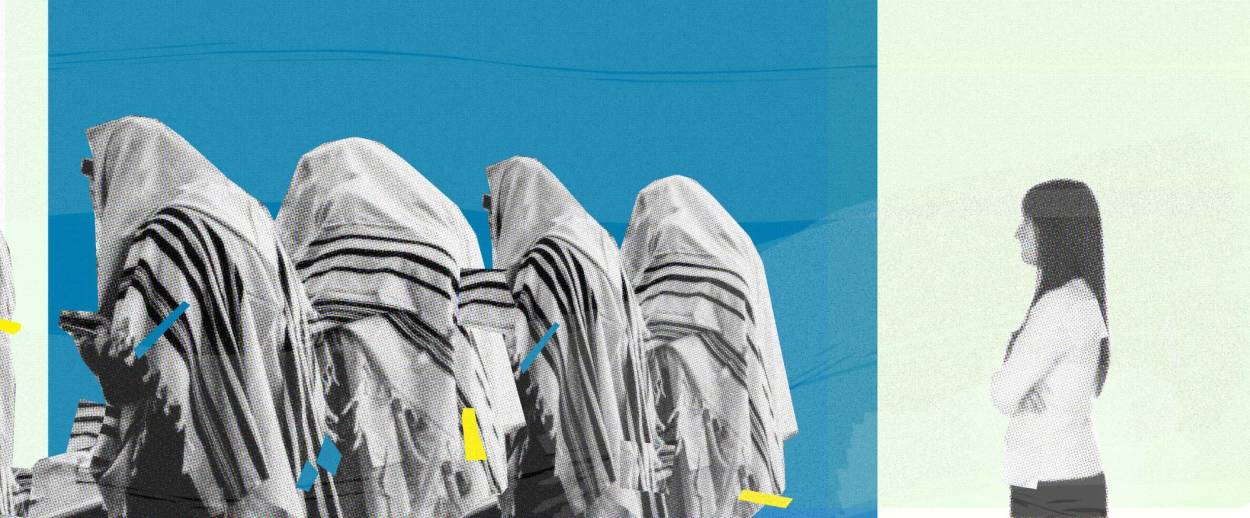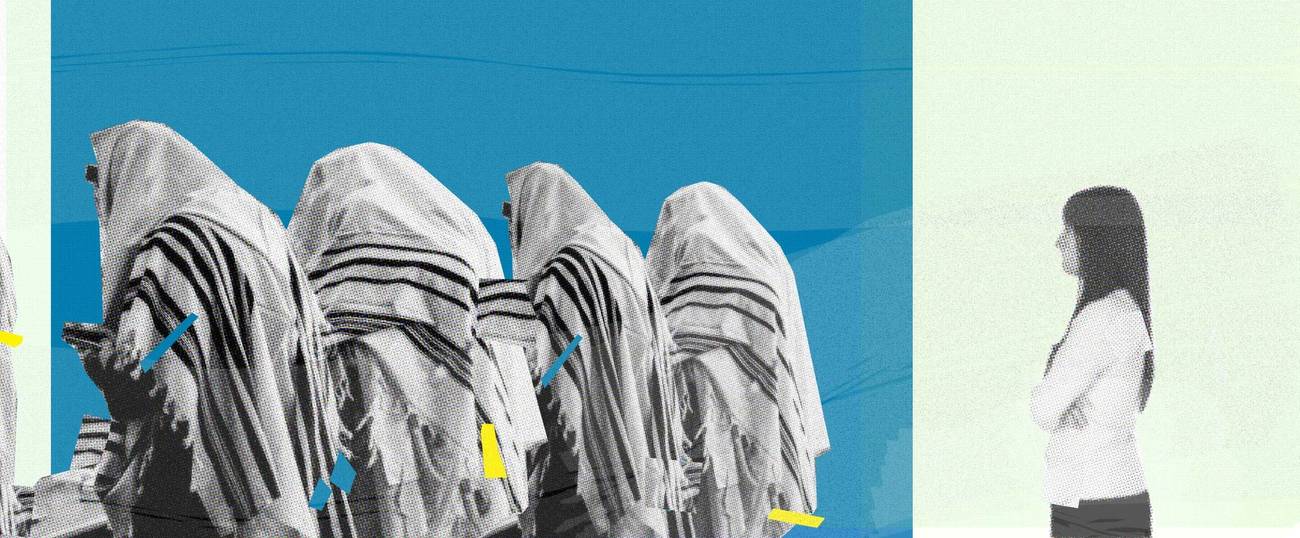A Time To Mourn Without a Place to Pray
When I wanted to say kaddish for my mother, I found that my options as a woman were limited—and less than welcoming




I was standing in a pen, like a holding pen for livestock, or so it sometimes felt. I was in an office building in Lower Manhattan in a small area of a large conference room sectioned-off by a black, fabric folding wall reaching three-quarters to the ceiling. The folding wall was a mechitzah separating the space into a men’s and women’s side for a mincha minyan, or afternoon prayer service, to which I had come to say kaddish for my mother.
The men’s side was spacious. It had two or three large tables, several dozen chairs, and a row of windows along one wall. On our side, there were no chairs or tables, and the folding wall curved around, cutting off access to the windows. The 10 or so women praying stood in staggered fashion, trying to give one another room in the cramped space.
It had been almost 11 months since my mother passed away, approaching the end of the mourning period, and I had visited my share of synagogues and minyanim.
Men have written extensively about their experiences observing the kaddish ritual. In books and articles, they have delved into the origins of the custom and mulled over its beauty and tedium. They have explored the sorrows, rage, frustrations, and comfort that can accompany the year of mourning. Yet, as a woman saying kaddish, I quickly found that instead of being able to immerse myself in this ritual, these precious moments were overshadowed by feelings of self-consciousness and discomfort just because I was a woman trying to honor her mother as a Jew.
***
Immediately following the burial of a parent, a child is immersed in an 11-month mourning period that begins with the seven days of “sitting” shiva and progresses through stages of lesser intensity as the months pass. Throughout this period, the mourner daily recites the kaddish, or more precisely, the Mourner’s Kaddish, a prayer that requires a communal service. When my mother died suddenly in June of last year, I knew I would be reciting kaddish for her, if not every day, then as often as I could. Although not Orthodox, I grew up in a fairly traditional Jewish home, observing a certain amount of Jewish practice and belonging to both Conservative and Orthodox congregations. Some two decades prior, I had watched as my father recited kaddish daily after his own mother passed away.
So on the evening of the Monday that I got up from sitting shiva, I went to services at the Conservative synagogue nearest my home in Brooklyn, which, at the time, had a weekday minyan, but one that still adhered to Orthodox protocol of counting only men toward the quorum of 10 adults required for reciting communal prayers. My husband came along, as much for moral support as to help make the quorum. But when we arrived, we found just three men—the synagogue sexton, my husband, and another man—and one elderly woman. The congregation very rarely got a quorum on weekdays, the sexton told my husband, especially during the summer.
Not to worry, I thought. Given the number and variety of places for Jewish worship in New York City, finding a place to recite kaddish would be as easy as looking up the congregations nearest home and work and checking their daily schedules. And this would have been the case—had I been a man.
Several nights later, I visited an Orthodox congregation one neighborhood over. I was the only woman there. Again my husband came with me, and when it came time to recite the Mourner’s Kaddish, I listened from behind the mechitzah as the rabbi asked my husband whether he would be reciting the prayer for me. When my husband replied that I would be saying kaddish myself, the rabbi practically started shouting the prayer in unison with me. Is he trying to help me out in case I don’t know the words, I wondered as I struggled to hold my own, or is he just trying to drown out my voice?
The kaddish does not speak of the dead. Rather, it is an ancient hymn sanctifying God and the divine name. The bereaved affirms faith in God’s ways despite the loss just experienced. Tradition also holds that if an offspring of the deceased leads the community in praising God, this will merit the soul of the departed, ensuring that he or she will achieve salvation. This is why the Mourner’s Kaddish—as well as other versions of the kaddish, of which there are several—may only be recited as part of public prayer. Because women have no role or only a very limited role in public prayer in most Orthodox communities, a woman reciting the kaddish is a matter of controversy. At play are issues of modesty (a woman’s voice is seen as a possible distraction to men during prayer) and whether reciting the Mourner’s Kaddish does, in fact, rise to the status of leading public prayer. While a number of Orthodox congregations permit a woman to recite the kaddish, and some permit it if a man is doing so as well, many don’t allow it at all.
My own synagogue, a Modern Orthodox congregation in Brooklyn, does permit women to say kaddish, and that is where I often went for the Sabbath. But this synagogue had no quorum for daily services, and moreover, it was too far for me to attend on a daily basis.
Liberal branches of Judaism, meanwhile, allow women to participate in public prayer. Yet, there I found the possibilities for attending daily services much more limited and no congregation was close enough to home or work—nor, as a rule, are there liberal independent weekday prayer groups that meet outside of synagogues.
Around my home, therefore, my options for saying kaddish daily turned out to be next to none. Ever hopeful, I looked to possibilities near work—which is how I found myself 11 months later behind that black folding wall in Lower Manhattan. I was grateful that this minyan made provisions for women to pray and that there were women who attended. Yet I was, with one exception, the only woman who ever used her voice during prayer and who said the Mourner’s Kaddish out loud as the men on the other side were reciting it.
Over the months that I had attended services with this group and several others around the city, I found my thoughts consumed more with the uncomfortable experiences of social exclusion than with those of mourning. I may have been thinking of the last time I saw my mother alive or about the week she died when I set out from the office to go to a minyan down the street, but by the time I had taken my place among the worshippers, too often I was caught up in the sorts of feelings one has at a party where you sense you are not wanted or don’t belong.
There was the awkward silence and averted eyes, each time as I waited for the elevator with a group of men—all going to the same minyan. Or the minyan that preferred to know ahead of time if I, as “the woman,” was going to be there.
There was the time when a mechitzah was not yet set up, and as the women moved the panels back and forth, attempting to get them into place, a man stepped over from behind the other side and declared with irritated sarcasm, “Why don’t you just put it where you want it and tell us where to stand,” as if this were not what men were doing to women all the time.
Or the time when the service ended without a Mourner’s Kaddish, because, apparently, no man needed to recite the prayer and the fact that a woman “on the other side” needed to do so was not even a thought.
There was the minyan that, although relatively welcoming—some of the men spoke to me and one even said he was glad to have me join them—had no mechitzah up, so they hastily created one from a tall filing cabinet. Happy enough to oblige, I took my place in the makeshift nook between the wall and the filing cabinet, dropped my things onto a chair that I had squeezed into the space, and waited for services to begin. Just as prayers started, a young man ran over and pushed a chair a few feet in front of me, as if he were closing the gate behind the sheep after they had been led into the pen for the night. Was he afraid I might run out? What else could I do but laugh?
What, I wondered, was so dangerous or infecting about me as a woman that I had to be treated as something to be contained? It was not the mechitzah that I was objecting to; my own shul has one. It was the way it was so often used. It was the way we women had to make ourselves small and silent, even when we just wanted to recite a simple prayer for the dead. Exactly what commandment, I wondered, was a man fulfilling when he drowned out the voice of a woman grieving for her mother? What does this say about the Jewish community? And since Jewish law is said to be grounded in divine will, can this really reflect the intent of a benevolent deity?
There were exceptions, of course—my Brooklyn shul being one of them. A shul in Manhattan’s Garment District was another. These places brought true meaning to the traditional farewell of those leaving a shiva house: “May God comfort you among the mourners of Zion and Jerusalem.” And there are other such congregations in New York, especially on the Upper West Side. Too often, however, I ended up feeling like some sort of interloper, as if I were making a statement by reciting the kaddish, when, in fact, I wasn’t trying to make a statement at all. Even under the best of circumstances, at services where a woman reciting the Mourner’s Kaddish was perfectly acceptable, I felt a bit self-conscious standing among friends or strangers and raising my voice. Grief is private; the kaddish is not.
As the months passed, I became aware that reciting the Mourner’s Kaddish was not just a way to honor my mother, an Israeli-American and a proud and committed Jew. It was also a way to stay close to the days and moments just after her death, and, by extension, a way to remain close to the time before she died—the days, weeks, and months when she was still alive. This, for me, was perhaps the greatest solace that the kaddish conferred. Yet among the greater congregation of Israel, I often felt isolated or tolerated at best, rather than “comforted among the mourners of Zion and Jerusalem.”
Like this article? Sign up for our Daily Digest to get Tablet Magazine’s new content in your inbox each morning.
Talia Bloch is a writer and poet living in Brooklyn whose work has appeared in The Brooklyn Rail, The Forward, The Jerusalem Report, Tupelo Quarterly, and elsewhere.